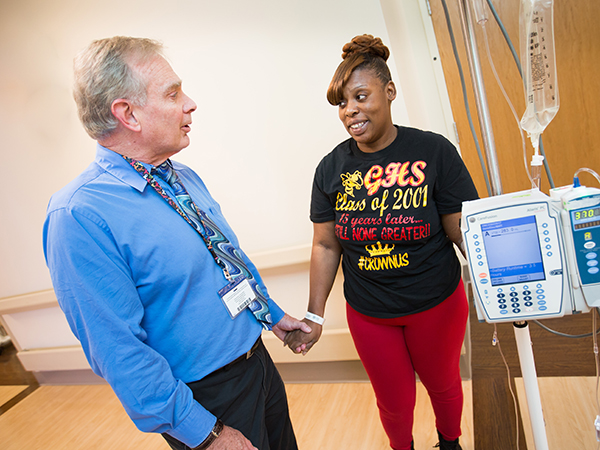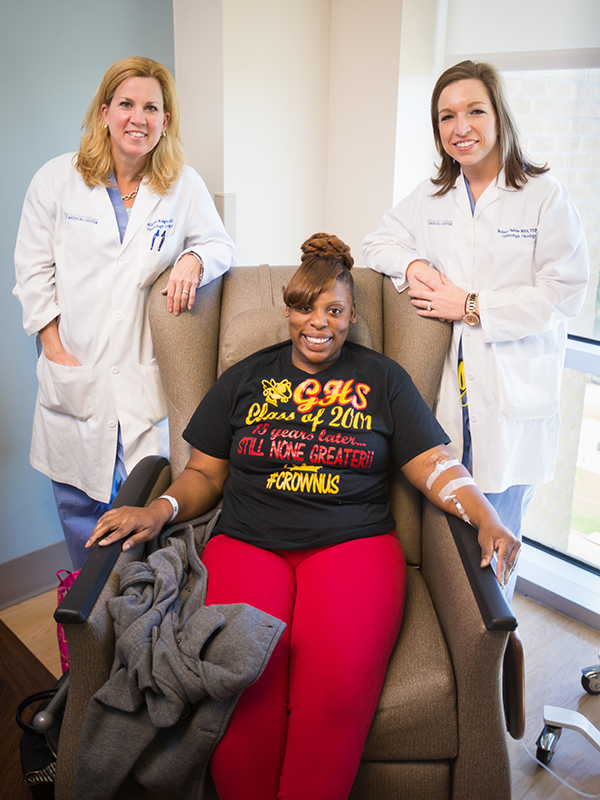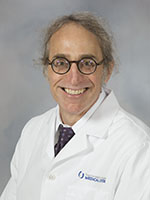Cancer screening deemed life-changing for Brandon woman

Published in News Stories on April 24, 2017
A cervical cancer diagnosis prompted Tomeka Harps of Brandon to become an advocate for screening, the procedure that detected her cancer and led to immediate treatment.
Harps' cancer was discovered as part of the College of American Pathologists Foundation's See, Test & Treat® Program that provided free breast and pelvic cancer screening to underserved women. The screenings, along with one for acral melanoma, were offered by the University of Mississippi Medical Center, CAP and New Horizon Church in Jackson.
“That program is so important,” she said. “Since I've been diagnosed I've been talking to so many women. They haven't seen a doctor. Some can't afford it and some are scared.”
Recently, as she received chemotherapy, she rolled her IV into a hallway to meet Dr. Kim Geisinger, professor of pathology and one of the UMMC pathologists who helped organize the screening.
“This made the circle complete for me,” Geisinger said. “Pathologists, for the most part, don't get to meet patients post treatment. She looked happy. She has a positive outlook.”
Holding her hand, he offered encouragement. She offered thanks.
“Whatever I can do to be out there, to be that voice ... Whatever I can do to help, I will be there,” Harps said.
Harps uses her own story to advocate for screening.
After several years of having abnormal Pap test results, she got tired of the return visits and quit seeing her doctor, she said. Five years later, her New Horizon congregational care nurse, Ella Jackson, insisted the Brandon resident go to the Jan. 28 screening.
“It was Stage 2B,” Harps said. “I was diagnosed on Saturday. Bethany (Sabins) called me and said we need you to come in Monday morning. By Wednesday I was seeing a radiation oncologist.”

Harps relaxes with Dr. Mildred Ridgway, left, and Bethany Sabins.
Sabins, a nurse practitioner in the UMMC gynecologic oncology program, secured the appointment. Dr. Mildred Ridgway, assistant professor of obstetrics and gynecology, met Harps on Monday for a biopsy. Geisinger, who interpreted Harps' Pap and called Sabins, also read the final diagnostic results early Tuesday.
Harps is fortunate the cancer hadn't spread beyond her pelvis, said Ridgway, who leads the gynecologic oncology program and is now Harps' primary cancer physician. As a medical provider who volunteered for the screening, she echoes others who say, “ST&T was a success if you diagnosed one patient who might benefit long term.”
Harps, with children ages 13, 12 and 8, said at 33 she values life more each day. She's completed radiation therapy, is in the midst of chemotherapy and then will have brachytherapy.
Her church members are still surrounding her with care, she said, noting several came to her house when she suffered a bladder infection and cared for her and her family for three days.
The value of every life is the element that led Geisinger and Dr. Stephen Raab, professor of pathology, to seek the CAP grant.
Raab points to community involvement as a plus.

Raab
“I've been involved in faith-based organizations before,” he said. “This is just the beginning of how we can do that. As a project, we learned where the barriers are in and outside the institution.”
With New Horizon and partner churches recruiting women, UMMC volunteers from three cancer programs providing screening and CAP footing part of the bill and offering screening expertise, the group screened 41 women in the Jackson area.
Of 30 women who received a mammogram, 11 had abnormal readings. Of 33 who received Pap tests, two had abnormal readings. All participants were screened for acral melanoma, and four were referred for follow up. Physicians or nurses discussed results with each woman, and they were provided names and contacts for medical providers for follow up.
Cervical cancer is preventable and often can be caught early with a pelvic exam and Pap test that examines cells removed from the cervix. Changes in cervical cells may show up three to seven years before they become cancerous. A Pap test can detect early changes before a malignancy occurs. Removing the cells prevents cervical cancer.
Now, said Raab and Geisinger, it's about reaching more women.
The U.S. Cancer Statistics Working group, using data from 2013, reported that on a national scale, Mississippi is 45th in incidence of breast cancer in women and third in mortality from it and is 10th in incidence of cervical cancer and first in deaths from it.
Will they do the screening again? Raab points to the enthusiasm of participants and the women who received testing. Raab called it a success that can and should be replicated with improvements. The pair are working to make it happen.
“This is why we originally went into medicine,” he said. “This feeling you're really helping someone.”
The months of planning were worth it, Geisinger said. Because Harps is being treated at UMMC, they know her outcome. They may never know results for all who referred for diagnostic testing. For Geisinger, one is enough.
In the days before his meeting with Harps, he shook his head in wonder. “One person. To me that one lady made all the difference in the world.”
Now, Harps is pledging her help to make a difference for someone else. “You just can't take a chance on life,” she said. “You've got to value life more.”


